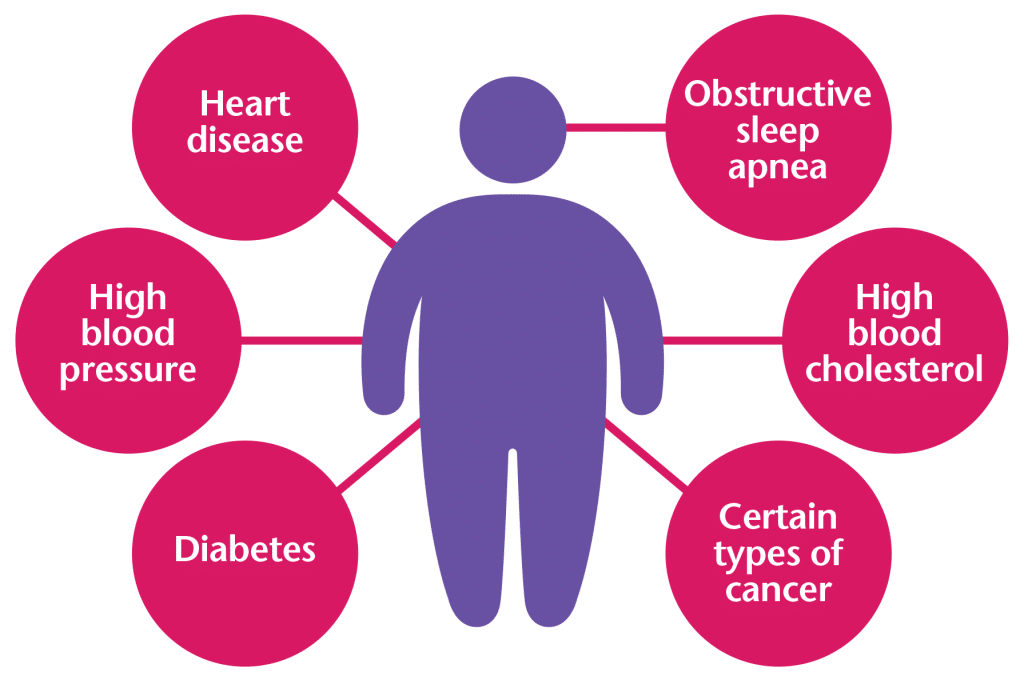
We all know that eating healthy can be expensive. The methods of food production that boost the volume and speed at which foods can be produced tend to introduce unhealthy food stabilizers, flavor enhancers, and unnatural chemicals into the food. By contrast, healthy foods are grown in ways that are natural, or closer to natural. But naturally grown foods are difficult to sell in a market where producers must compete with those who use unnatural methods to boost production.
This is only one factor in the cost-equation of eating healthy vs unhealthy eating. While healthy foods do cost more at the register, they offer a boon of natural energy, well-being, fewer hospital visits as well as a longer and happier life. Here we will discuss 8 risks of obesity and their associated costs.
Heart Disease & Stroke
High blood pressure and cholesterol are two conditions that lead to strokes and heart disease, and both are highly correlated with obesity. Heart disease is the number one killer among the common health risks in the U.S. This means being overweight by just 5 to 10 percent significantly raises your risk of an untimely death from a heart attack. It also increases your risk of debility or death by stroke by more than 75 percent above average.
High Blood Pressure
Carrying excess weight causes the heart to have to work harder as the arteries will be clogged and constricted by the extra body fat. High blood pressure also contributes to the risk of heart disease, which we know is a high-volume killer. High blood pressure places a high degree of stress on the delicate and vital vascular tissue causing it to break down over time. This leads to a number of cardiovascular disorders.
Type 2 Diabetes
Type 2 diabetes limits longevity and the quality of life for those who suffer from it. Diabetics must undergo a lifetime of expensive, time consuming, and painful treatments. From the time, they are diagnosed until death, many diabetics require the amputation of digits and limbs as very poor circulation deprives the extremities of vital nutrients. In addition, many of the most serious cases become wheelchair bound before the age of 60.
Certain Cancers
The condition of being just 10 percent overweight is associated with an elevated risk of cancer. But the types of cancer most commonly associated with obesity are; colon cancer, breast cancer- after menopause, cancer of the kidney, and cancer of the esophagus. Sadly, these types of cancers are all known for their high mortality rates- especially when they go undiagnosed for extended periods of time. Worse, is the fact that these cancers are also among the most difficult to detect.
Gallbladder Disease & Gallstones
Those who are overweight also have an increased risk of developing gallstones and gallbladder disease. These painful disorders of the digestive organ can cause dangerously rapid weight loss, painful urination, and the inability to eat normally.
Osteoarthritis
This common condition is typified by often excruciating pain in the lower back, knees, and the hips. The extra weight that severely obese individuals must carry imposes a severe burden on the skeletal system. The normal human skeleton is only fit to carry a healthy body for up to 90 years on average. So, it stands to reason that packing on extra weight, usually for many years at a time, will severely limit the operational life of the human skeleton- wearing down protective cartilage, vertebrae, and spinal discs, as well as taxing the body’s healing ability by constantly diverting resources to these compromised skeletal structures.
Gout
This painful joint disorder is caused by an excess of uric acid within the circulatory system. The excessive uric acid forms hard, abrasive crystals which are deposited in the joints. The more overweight a person is, the more likely they are to develop gout.
Difficulty Breathing
Sleep apnea is a common breathing disorder affecting obese persons during sleep. Sleep apnea can lead to heart problems, stroke, and is commonly associated with unsatisfying rest and sleepiness during the waking hours. Sleep apnea can be a very dangerous condition when it is acute and instantiate a host of cardiovascular disorders. The good news is, many of these conditions can be alleviated- and sometimes reversed- by losing between 5 and 10 percent of the total body weight. In some cases, the damage may not be permanent- when not too far gone- and even in the worst cases, a great deal of relief can be gained by losing weight. What’s more, by avoiding and preventing these conditions, a person can forego innumerable visits to the hospital- and save upwards of hundreds of thousands of dollars over time.
If you are experiencing some of these conditions, a weight loss program like Doctors Weight Control might be able to help you. Contact us to schedule your weight loss consultation!

